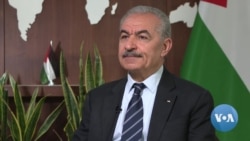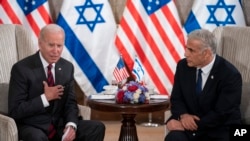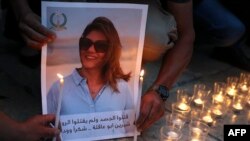In an interview with VOA White House bureau chief Patsy Widakuswara, Palestinian Prime Minister Mohammad Shtayyeh warned against a growing militarization of the region as several Sunni nations and Israel discuss cooperation against Iran. But he said he was confident that Saudi Arabia would not recognize Israel before there was an Israeli-Palestinian settlement. He also said President Mahmoud Abbas was sincere about hoping for a new peace opening with Israel.
The following is a partial transcript taken from that interview. It has been edited for clarity and brevity.
VOA: Mr. Prime Minister Mohammad Shtayyeh, thank you so much for joining VOA today.
PALESTINIAN PRIME MINISTER MOHAMMAD SHTAYYEH: Thank you for having me.
VOA: So, President Biden came to the West Bank. He came with sympathetic words and offered to renew ties with the Palestinians, and renewed support for the two-state solution. Do you believe that he is genuine?
SHTAYYEH: I mean, by all means. He said he believed in two states, and he conveyed this to Golda Meir in his first visit to the region in 1973. And he is a true believer. That's what he said. And I think he does, he does believe in two states. The issue for us is not what do you believe in. The question is that there is a systematic destruction of two states, and the most serious enemy of two states is settlements.
VOA: These are complaints that we have heard very often from the Palestinians. On the other hand, the Israelis and also the Americans believe that there is not a united partner from the Palestinians to achieve a settlement. You have had a split government since 2006, you have not had elections since 2006. So what can you say, what can you convince people around the world, and also the Palestinians, to say that you do have the mandate to reach a two-state solution?
SHTAYYEH: Well, look, what about the situation that was before 2006? Palestinians were united and nothing has happened. On the contrary, it's because nothing has happened, we lost the elections in 2006. So the situation has to be reversed, in a way.
VOA: I just want to go back again to President Joe Biden's visit. So, President Joe Biden, since last year, has resumed assistance to the Palestinian people that President Donald Trump cut. However, he has also continued some of President Trump's policies, including not reopening the U.S. Consulate in Jerusalem. He did not criticize Israeli settlements while he was in the region. In your view, how does Joe Biden compare to Donald Trump?
SHTAYYEH: Oh, incomparable. I mean, by all means, we were not talking to the Trump administration, and now we are relinking, and we are reconnecting, and we are talking to the Biden administration at every level.
When it comes to the assistance, also, it is important that Washington has announced assistance to the Palestinian people. I mean, helping in otherwise important East Jerusalem hospitals and so on, but again what we need is official assistance to come to the state of Palestine, to come to the Palestinian government.
Now Europe has resumed its aid to us, we are hoping that Washington will resume direct aid to us, which has not — this aid that has been announced is not direct with us but of course, our people will benefit from it at the end of the day, and it will create some sort of economic improvement on the ground.
VOA: We just met some of your people. The one you're speaking about assisting, when you're speaking about financial aid. We just met some young Palestinians today and one of them told us that he's very frustrated with the Palestinian Authority, the level of corruption, and the level of the lack of good governance. And he doesn't believe that you, the Palestinian Authority can facilitate his aspirations towards a life of freedom and a life of prosperity. What would you say to those people?
SHTAYYEH: Well, look, I mean, we are fighting corruption at every level. This is something that no one can tolerate, one second. I understand the frustration — the frustration has to do with quite a number of issues. One, that is no political progress. This man that you are talking about, he needs to see tomorrow — he needs a better tomorrow.
Look, I mean, if you want to go to Jerusalem, you need a permit. If you want to go to Gaza, you need a permit. If you want a job, you need to get a permit. If you need to establish any economic facility, you need a permit from the Israelis.
VOA: The U.S. right now is very much focused on the war in Ukraine. And as part of that focus, President Joe Biden is trying to shore up alliances around the world, including the growing alliance, the growing friendship between Arab nations and Israel to counter Iran. What are your thoughts on this warming of relations in terms of how it might impact the Palestinian cause toward a two-state solution?
SHTAYYEH: Well, look, Jordan normalized relations with Israel immediately after Israel withdrew from the occupied Jordanian territory. Egypt normalized relations with Israel after Israel withdrew from the Egyptian occupied territory, which is Sinai. So for us, the common factor between all Arab countries was that a peace initiative was designed on the basis of the following: Arabs will normalize relations with Israel on the assumption that Israel will end its occupation of the Arab and Palestinian occupied territory. This is something that has not happened. And therefore for us, we are committed to the Arab Peace Initiative because that did enjoy an Arab consensus. … Now for us, what we need is Arab coordination, whatever it is and whatever the direction is, we are supposed to go to war together or we are supposed to go to peace together.
VOA: Are you concerned the Saudis might normalize relations with Israel?
SHTAYYEH: No, I don't think, I mean the Saudi position is very clear. Crown Prince Mohammed bin Salman was very clear, and the minister of Foreign Affairs was extremely clear on more than one occasion. Saudis will not normalize with Israel unless Israel ends its occupation to the borders.
VOA: Do you believe that?
SHTAYYEH: I do, of course. I think the Saudis are very genuine about that. And I think what we hear from them is important. And I think what was said at the Jeddah summit in the presence of President Biden was very important. I mean all Arab speakers, they stressed the centrality of the Palestine question and that peace is a crucial issue in the region only if the question of Palestine is settled.
VOA: We have seen that narrative or that principle be challenged with the Abraham Accords, with UAE and Bahrain, recognizing Israel even without any kind of diplomatic progress.
SHTAYYEH: But also, the United Arab Emirates and Bahrain, they also said in their speeches … that Palestine is a crucial issue and Al-Aqsa Mosque is the central issue of the conflict and that a two-state solution is the only solution. I mean all Arabs, they believe in that for us.
As I said, the most important issue is a commitment to the Arab Peace Initiative. We are committed to that. And unfortunately, it is Israel that is rejecting the Arab Peace Initiative. It is the Israelis who didn't buy it even when it was issued in 2002. This was years ago. I mean, 20 years ago now after the Arab Peace Initiative and the Arabs who were genuine when they presented it, they wanted peace in the region on the basis of a land for peace formula.
VOA: There's also a growing security partnership between Arab nations and Israel to counter the threat of Iran. Would the Palestinian Authority join that coalition, would you be able to explain it to the Palestinian people?
SHTAYYEH: There is no coalition. We all know we hear the statements yesterday and a few days ago in Jeddah that the Iranian issue needs a political solution. And I think that Washington is negotiating, Europe is negotiating with the Iranians. There was an agreement with Iran, and I think the Saudis are also talking to the Iranians, everybody is.
United Arab Emirates has announced explicitly and clearly that they are not going to be part of any coalition against Iran and so on. So, the issue for us is not about coalitions or polarization of the region. The issue is that we need a peaceful region and in order for us to have peace for the region, everybody has the right to be sovereign within their own borders, including the Palestinians.
VOA: Just to get into that issue, there may not be a formal security Middle East NATO type of coalition, but there is a growing partnership and there is growing cooperation for example in this area in a missile defense system that the U.S. is trying to encourage Arab nations and Israelis to build together. How does the Palestinian Authority feel about that?
SHTAYYEH: I mean, we don't like to see a militarization of the region. We would like to see a demilitarization of the region, this build-up of arms, it doesn't take us anywhere. The region is already bleeding. You know Yemen, Syria, Iraq, most of the region is bleeding. You don't need to build military capacity in the region.
The region needs a peaceful solution, the region needs economic development and in order for us to go into that direction, I think investments should go into that direction. It's a pity that billions of dollars are spent on arms, if these billions of dollars are spent in poor countries, we could have avoided a failing state in Yemen or a situation in Syria or in Iraq and so on and so forth. That is what the region needs. It needs economic development, hope for the future, the young generation, and also prosperity because without that, based on peace, the most important part of the story is that we have not seen the fruits of peace. We have not seen the peace process ending in a successful product and outcome.
VOA: And that begins with political dialogue, and I understand that President Mahmoud Abbas has just recently spoken to Israeli Prime Minister Yair Lapid as well as Hamas leadership. Do you think that this opening can lead to something more constructive and more permanent? \
SHTAYYEH: Well, I mean the president in his press conference in the presence of President Biden, he was explicit. He said, ‘I extend my hand to the Israelis. Let's sit down together and solve it.’ We are ready for that.
VOA: Is that realistic?
SHTAYYEH: It's very realistic because our president was a real champion for the whole of the peace process, and he believes in it genuinely. And I think we all do. We all do, simply because we know that for successful peace negotiations, it is in the benefit of the Palestinians. We are the ones who are under occupation. It's not our tanks that are surrounding Tel Aviv. It's the Israeli tanks that are occupying Ramallah and all other parts of Palestine, including Jerusalem.
So, for us, I mean we are also realistic, we are very realistic people. We know that there is no government in Israel, but even when there was a government in Israel. Remember what [former Prime Minister Naftali] Bennett was saying? Three nos: no to talks to President Abbas, no negotiations with the Palestinians, and no to two-state solution. When you have, when you don't have a partner in Israel, with whom shall we talk?
VOA: We heard Prime Minister Lapid confirm his support for the two-state solution. I want to just go back again to what you mentioned because I think this is important.
On the case of Shireen Abu Akleh, do you believe the conclusion of U.S. investigators that the bullet was likely an Israeli bullet, but they had no reason to believe that it was intentional?
SHTAYYEH: Well, look, first of all, there is no way that you can say it is intentional or not intentional before you ask the soldier who shot — who, who, who took the shots. The soldier has never been asked. So, if the conclusion that it was from the side of the Israeli army, then somebody should have asked the soldier. How is it possible for you to draw a conclusion that it is intentional or unintentional without asking the person or without asking the commander who was in the region? So, I don't buy this argument at all or this conclusion at all. Shireen Abu Akleh was killed by the Israelis. Full stop.
VOA: Do you think that the U.S. is shielding the Israelis from taking full responsibility?
SHTAYYEH: Well, I know that there was a technical report, a security report, but what was issued was a political report. And I know that there is a gap between a technical report and a political report, and I think the political report did stand short on reality. You cannot say that it is unintentional without asking the soldier who actually, you know, took the shot.
VOA: So my last question is for our viewers, our VOA viewers around the world who are Muslims or they live in Muslim-majority countries. As I mentioned, I grew up in Indonesia, so I'm very familiar with the Palestinian cause. However, I think there's a tendency for people to look at this conflict in a very black-and-white way, in a religious context between Muslims and Jews. Do you believe that kind of view is constructive to the Palestinian cause, and what would be your message to them?
SHTAYYEH: No. The conflict in Palestine is not religious. The conflict in Palestine is political because we stood against all occupations that occupied Palestine all along history. It has nothing to do with religion. We stood solid against the Iraqi occupation of Kuwait. That's an Arab Muslim Sunni country occupying another Arab Muslim Sunni country. So the issue is not about religion. The issue is about occupation.
My message, through you, is that we are people who want to see peace prevailing in our region. We are people who care about the dignity of our kids and, and men and women and so on. We are people who are looking for a better tomorrow, and we are people who are only asking for an independent, sovereign, contiguous state on the borders of 1967, which is only 22 percent of what used to be called Palestine.
I'm hopeful that tomorrow will be much better.







